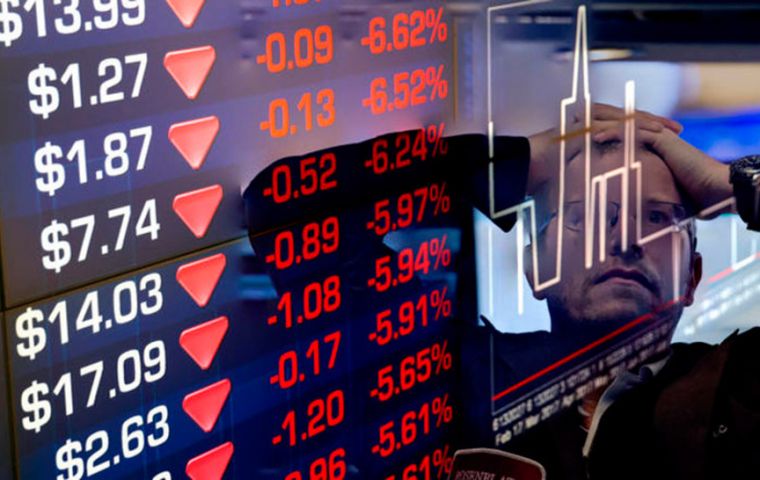MercoPress. South Atlantic News Agency
Oil Prices Ravaged By Financial Turmoil
 “The stock market and interest rates can really affect oil a lot,” told Mark Waggoner
“The stock market and interest rates can really affect oil a lot,” told Mark Waggoner By Nick Cunningham of Oilprice.com
Oil prices fell back suddenly over the last few trading sessions, dragged down by some forces beyond the oil market.
The steady decline of the U.S. dollar has helped drive up crude prices for weeks, but that came to an abrupt halt last week. A rebound for the greenback led to a steep decline in oil prices on Friday.
At the same time, sudden turmoil in the broader financial system also bled over into the oil market. Volatility in the stock market flared up on Friday, sparking the sharpest single-day upheaval in years.
The Dow Jones Industrial Average fell more than 600 points, only the ninth time in history that a fall of that magnitude has occurred. “The stock market and interest rates can really affect oil a lot,” Mark Waggoner, president of Excel Futures, told The Wall Street Journal. “It's spilling over into the energy markets and causing these ripple effects.”
The stronger-than-expected job growth and wage increases fueled speculation that the Fed would tighten interest rates more than previously thought. Bond yields continue to rise, undercutting equities. Signs of higher inflation also led to speculation of interest rate hikes from the central bank. The dollar gained 0.7 percent on Friday.
That led to a selloff for Brent and WTI. And if the turmoil continues, the trouble for oil benchmarks will also linger. “The potential is present for a big move lower should fear return to the stock market and spark liquidations across the board,” analysts at TAC Energy said Friday, according to The Wall Street Journal. “The cross-asset class correlations have returned over the past several weeks.”
The problem for oil is that both oil prices and broader stock indices are seen as overvalued by some analysts. Hedge funds and other money managers have piled into bullish bets on crude, leaving positioning in the futures market overextended.
“The price slide is due to a general worsening of sentiment. Stock markets around the world are under pressure, which confirms that the steep price rise in the preceding weeks was for the most part sentiment-driven,” Commerzbank wrote in a note. “There is only limited fundamental justification for the high price level … It is therefore conceivable that the correction in oil prices will continue.”
An unraveling of positions from major investors could expose WTI and Brent to sudden losses. That correction tends to occur when a spate of news goes against existing sentiment. The broader financial system is finally facing some questions after a remarkable bull run, which is magnifying the danger for crude benchmark prices.
“A global selloff in risk assets is gathering pace and sending the energy complex lower amid a sea of red,” PVM Oil Associates Ltd. analysts Tamas Varga and Stephen Brennock wrote in a report. “The risk-off environment throughout the energy complex comes as U.S. drillers added oil rigs for a second consecutive week.”
“You're starting to see a whiff of what I call the GMO trade — get me out,” Bill O'Grady, chief market strategist at Confluence Investment Management, told The Wall Street Journal.
It isn't all sentiment trading, however. We now have several catalysts that could provoke a liquidation of bullish bets: inventories rose last week for the first time in months, the rig count continues to rise and U.S. production is breaking records. Seasonally, oil demand is at a lull, pushing up inventories. These trends were expected, but still present downside risk to what is looking like an overvalued oil price.
Perhaps most importantly, supply growth from the Permian looms large over oil prices. Ed Morse, global head of commodities research at Citigroup, told The Wall Street Journal that U.S. shale could wreck the oil market once again. He argues that the industry is ramping up production, and that assurances over a more cautious drilling approach from shale executives should not be trusted. As production increases continue unabated, oil prices could collapse again. “2018 could turn out to look a lot like 2014 — a year that started with very high prices and ended at very low prices,” he said.




Top Comments
Disclaimer & comment rulesCommenting for this story is now closed.
If you have a Facebook account, become a fan and comment on our Facebook Page!